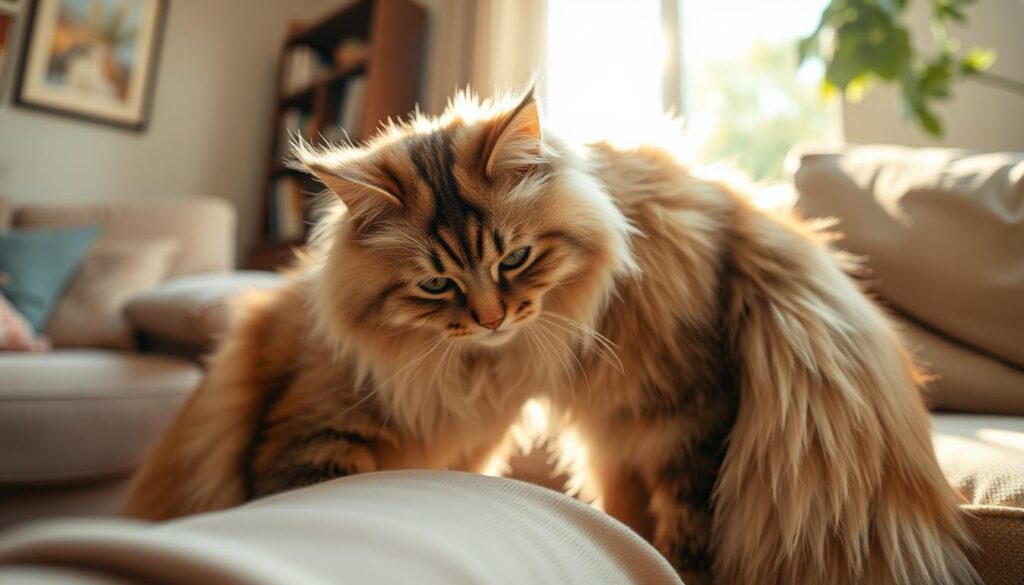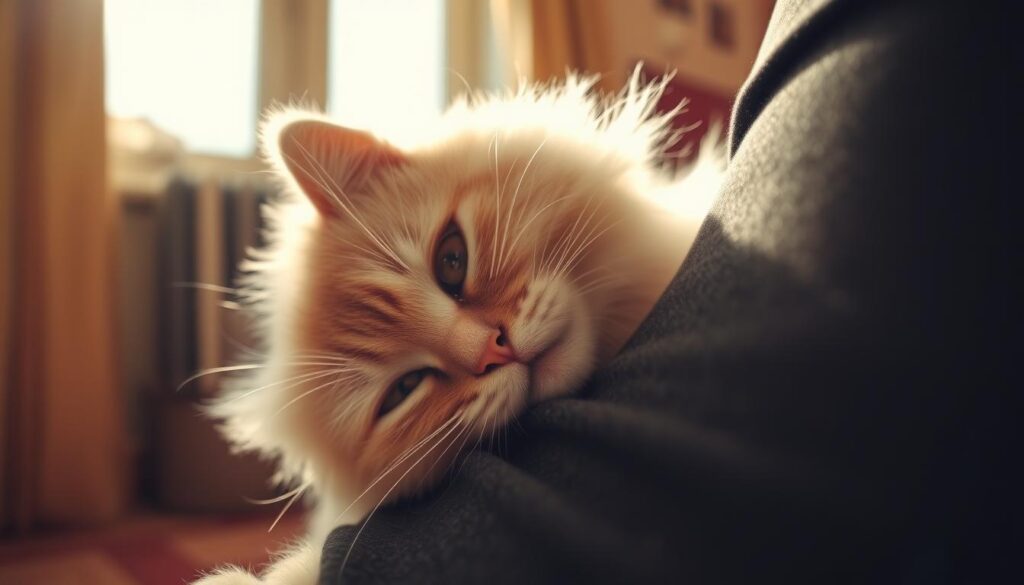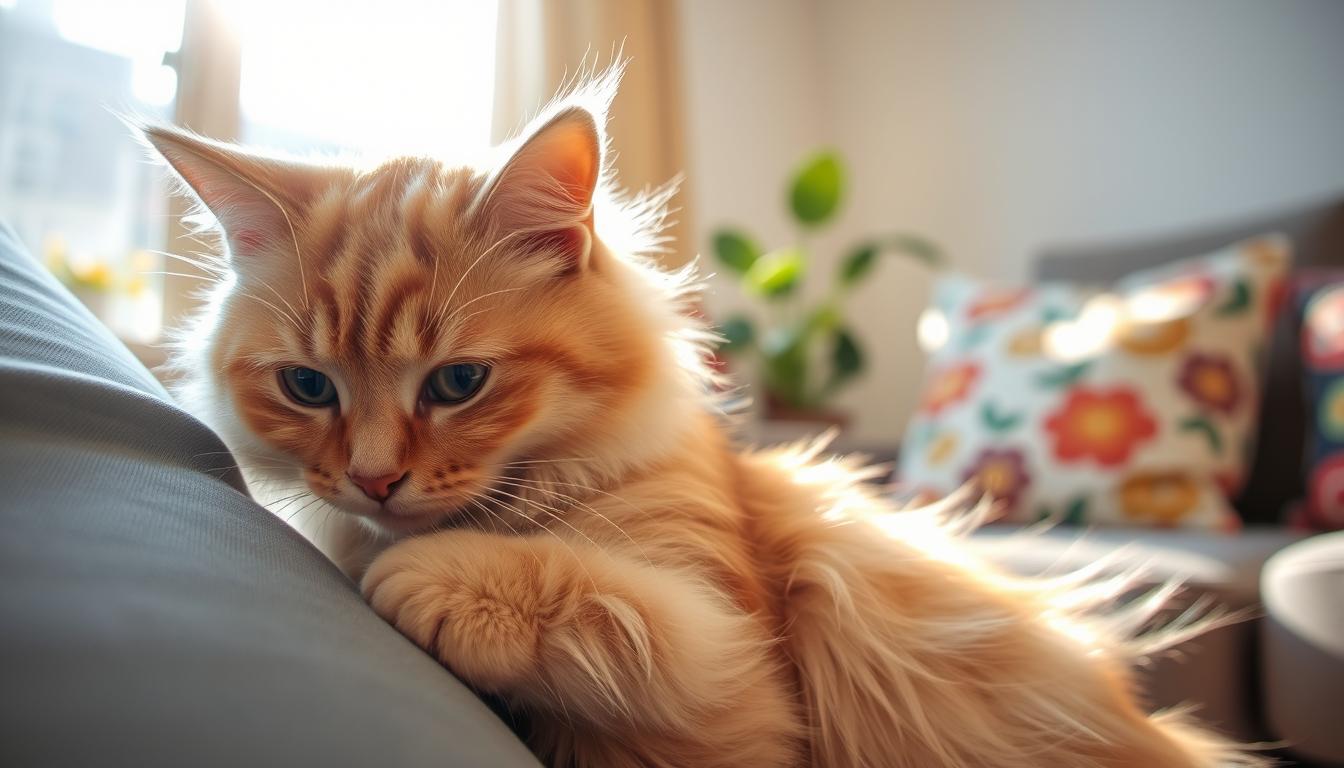As a devoted cat owner, I’ve often wondered about my cat’s curious behavior of rubbing against my legs. Is it a sign of affection, a territorial claim, or something else? Exploring cat communication, I found that this gesture is full of meaning. It reveals the complex lives of our furry friends.
Cat rubbing, or bunting, is a way cats communicate without words. They use it to show emotions and set social hierarchies. With over 200 million odor sensors, cats rely on their sense of smell to understand their world and connect with others.
Table of Contents
Understanding Cat Communication Through Body Language
Cats are experts at talking without words. Their body language tells us a lot about how they feel and what they want. They use scent glands on their cheeks, chin, forehead, and tail base to send messages. These glands release pheromones that mark their territory and talk to other cats.
When a cat rubs against you, they’re leaving their scent on you. This way, they claim you as their own. It’s like they’re saying, “You belong to me.” This behavior helps them feel connected and safe with their group.
The Role of Scent Glands in Cat Communication
Cats have a strong sense of smell. They use their scent glands to share many messages. These glands release pheromones that show a cat’s mood, status, and if they’re ready to mate. By leaving their scent, cats show they’re there, mark their territory, and signal they’re ready to find a mate.
How Cats Use Pheromones to Mark Territory
Cats also rub against things like furniture and walls to leave their pheromone scent. This territorial marking helps them set boundaries and warn others they’re there. By making their scent familiar, cats feel safe and confident in their space.
Learning about cat scent glands and pheromones helps us understand our cats better. By noticing these signs, we can meet our cat’s needs and strengthen our bond with them.
The Science Behind Feline Olfactory Senses
Cats have a super sharp sense of smell, with over 200 million odor sensors in their nose. This is way more than the 5 million humans have. Their sense of smell is key to how they explore and understand their world.
Both domestic and wild cats have a special dual olfactory system. This system includes the olfactory lobe in the forebrain and scent receptors. They also have a vomeronasal organ (VNO) in their mouth. This organ helps them smell even better.
- Cats can smell about 14 times better than humans.
- A cat’s olfactory membrane space is 4:1 compared to humans.
- Damaged VNO organs can increase aggression between cats.
Cats use their amazing sense of smell to mark their territory and understand their surroundings. Their feline senses are vital for socializing and marking their territory. They do this by releasing pheromones from special glands.
Learning about a cat’s sense of smell helps us understand their unique way of communicating and behaving. By recognizing the importance of their sense of smell, we can better meet their needs.
What Does It Mean If a Cat Rubs Against You?
When your cat rubs against you, it can mean many things. This behavior, known as cat rubbing meaning, shows how much your cat cares about you. It’s a way for them to express their feelings and needs.
Different Types of Rubbing Behaviors
Cats have different ways of rubbing, like head bunting, leg rubbing, and face rubbing. Each one sends a unique message:
- Head bunting: This shows your cat trusts and loves you, wanting to get closer.
- Leg rubbing: It’s like they’re saying, “This is my territory, and you’re part of it.”
- Face rubbing: They rub their face on you, leaving their scent and showing they’re connected to you.
Emotional Significance of Cat Rubbing
The emotional significance of cat rubbing depends on your cat and the situation. Usually, it means they feel safe and happy around you. But sometimes, it could mean they’re not feeling well or something’s changed at home.
Understanding your cat’s rubbing can help you meet their needs better. By noticing their body language and responding, you can build a stronger bond. This way, you can give your cat the love and care they need.
Head Bunting: A Sign of Trust and Affection
When your cat pushes their head against you, it’s called “head bunting” or “allorubbing.” It’s more than just showing love; it’s a way for them to mark you as part of their family. This behavior is seen in both house cats and wild cats, showing it’s important for all cats.
Cats have scent glands on their cheeks and forehead. By rubbing their head on you, they share their scent. This helps them feel safe and connected to you. It means they trust you and see you as a family member.

Studies say 83% of cats head bunt with their owners after being apart. This shows how important this behavior is. Cats use special smells to mark their territory, including their humans.
Head bunting shows feline trust and affection. It makes your bond with your cat stronger. By understanding this, you can build a closer and more loving relationship with your cat.
Leg Rubbing and Territory Marking
Leg rubbing is a common cat behavior. Cats rub their heads and cheeks against their owners’ legs or furniture. This act serves several purposes, including marking territory and seeking attention.
Cats have scent glands on their paws, cheeks, and other body parts. By rubbing against objects or people, they leave their scent behind. This cat leg rubbing makes them feel secure and helps them establish dominance in their environment.
When Cats Rub Against Strangers
Cats may rub against the legs of people they don’t know. This might seem like a friendly greeting. But, it’s also a way for them to gather information and mark the stranger with their scent. By doing this, the cat claims the person as part of their territory.
The Connection Between Rubbing and Feeding Time
Feline feeding habits can influence a cat’s leg rubbing. Cats may rub against their owner’s legs to get fed. This territorial behavior helps them communicate their hunger or need for interaction.
Leg rubbing is a complex behavior for cats. It allows them to mark territory, seek attention, and communicate their needs. Understanding this behavior can help owners better connect with their cats and strengthen their bond.
Face Rubbing and Scent Marking Behavior
Cats have a special way to talk and mark their territory by rubbing their faces. They have scent glands on their cheeks, chin, and forehead. When they rub against you or things, they leave their scent behind, claiming it as their own.
Face rubbing is more than just scent marking. It shows love and trust too. Cats rub to make their space smell familiar, making them feel safe. It’s their way of saying hello and learning about their world through smell.
The Purpose of Feline Facial Glands
Cats have special facial glands that make pheromones. These are chemical signals that share information. When a cat rubs its face on you, it’s leaving its scent, marking you as part of its group. This makes them feel more at ease and confident.

- Cats use face rubbing to create a familiar scent in their environment.
- Face rubbing helps cats feel safe and secure by marking their territory.
- Cats may also rub their faces to greet you and gather information through scent.
Knowing why cats rub their faces helps pet owners understand them better. It strengthens the bond between them.
Why Female Cats Show Increased Rubbing Behavior
Female cats rub more often, especially when they’re in heat. This behavior is tied to the hormonal shifts they go through during their reproductive cycles.
Heat Cycles and Affectionate Behavior
Unspayed female cats usually go into heat every 2-3 weeks in breeding season. When they’re in heat, they become more vocal and restless. They also rub more against people, objects, and surfaces.
This behavior is part of their natural mating instincts. They try to attract mates by leaving their scent.
Understanding Hormonal Influences
- During a female cat’s heat cycle, her body undergoes fluctuations in feline hormones, such as estrogen and progesterone.
- These hormonal changes drive the female cat behavior patterns, including the desire to rub and mark territory more frequently.
- The cat heat cycle and its associated hormonal influences can lead to a significant increase in a female cat’s rubbing behaviors.
Knowing how female cat behavior, heat cycles, and hormones are connected helps owners understand their cats better. It also helps manage their needs during this natural reproductive phase.
When Cat Rubbing Becomes Excessive
Cat rubbing is normal and common. But, if your cat starts rubbing more or more often, it might mean they have health problems. These could be allergies, fleas, ear infections, or even neurological disorders. It could also mean they’re feeling stressed or anxious.
Seeing a big change in your cat’s rubbing? It’s time to talk to a vet. They can check for any medical reasons.
Cats rubbing their faces on you when you come home is a sign of happiness. But, if they’re rubbing too much, it might mean they have feline behavior problems or cat health issues. Watch for any changes in their rubbing and act fast to keep them healthy.
- Cats rub against things to mark their territory and leave their scent, which is common.
- Rubbing helps cats gather new information by smelling things, which is a regular way for them to learn.
- They rub against owners to get attention, which is a common way for them to ask for something.
If your cat’s rubbing behavior gets too much, see a vet. They can find out why and help fix any cat health issues. Knowing why your cat acts a certain way helps keep them happy and strengthens your bond.
| Behavior | Possible Causes | Recommended Actions |
|---|---|---|
| Increased frequency of rubbing | Stress, anxiety, medical issues (e.g., allergies, skin conditions) | Consult a veterinarian, identify and address the underlying cause |
| Intense or aggressive rubbing | Pain, discomfort, neurological problems | Seek veterinary evaluation and treatment |
| Sudden changes in rubbing patterns | Environmental changes, new household members, medical conditions | Monitor the situation, consult a veterinarian if the changes persist |
The Connection Between Rubbing and Biting
Cats show love and communicate through touch. Cat rubbing means they trust and bond with you. But sometimes, rubbing can turn into a bite. This can surprise and worry owners.
Understanding why this happens can help. It’s not always bad.
Managing Overstimulation in Cats
Cats get overwhelmed by too much touch. Their skin is very sensitive. When they’ve had enough, they might bite gently.
This is their way of saying they need a break. It’s a sign they’re feeling overstimulated.
Redirecting Hunting Instincts
Cats are born to hunt. Without toys, they might bite their owners. Rubbing can mean they’re ready to play or hunt.
Playing with them and giving them toys helps. It keeps their hunting instincts healthy.
Knowing when your cat is too stimulated is key. Respect their limits. Give them fun toys and playtime. This strengthens your bond with them.
Building Stronger Bonds Through Physical Contact
The cat-human bond is special and cherished. Physical contact is key in making this bond stronger. When your cat rubs against you, it’s more than just showing feline affection. It’s a way for them to mark you as their own and show trust.
Showing your cat love through gentle petting and letting them choose when to touch can deepen your bond. Cats use touch to share their feelings. By understanding their body language, you can meet their needs better.
- Cats show love through non-verbal signs like tail and ear movements.
- A slow blink (a “cat kiss”) means trust and love from the cat to its owner.
- Mutual grooming, like a cat licking its owner’s hand, strengthens the bond.
Cats also show love by bunting, or gently rubbing their head against you. This action leaves their scent on you, showing they trust and claim you as their own.
| Behavior | Meaning |
|---|---|
| Slow blinking | A “cat kiss” signifying trust and love |
| Mutual grooming | Strengthens the bond between pet and owner |
| Bunting | Marking the person with scent glands, a sign of trust |
Understanding and respecting your cat’s touch preferences can make your relationship with your feline friend stronger. Cherish these moments of love and trust to bring you and your cat closer.
Warning Signs and Health Concerns Related to Rubbing
Rubbing is usually a normal behavior in cats. But, changes in their rubbing can mean health problems. If your cat rubs too much and shows signs like hair loss or skin issues, it might have allergies or parasites. Seeing a vet is key if your cat’s rubbing changes or if they seem uncomfortable.
Changes in how cats rub can hint at health issues. For example, they might rub more if they have skin problems or pain. Watch for other signs like aggression, appetite changes, or odd urination. These could mean your cat needs vet care.
If you’re worried about your cat’s rubbing or health, it’s best to see a vet. They can check your cat, run tests, and suggest treatments. This way, you can keep your cat happy and healthy.

